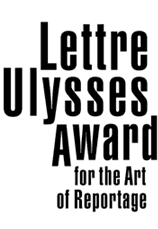
First Press Release 2003
Berlin, 1 July 2003
The Lettre Ulysses Award for the Art of Reportage
In Berlin on October 4, 2003, a jury consisting of internationally recognized writers will award the very first prize ever for the best reportage literature in the world. The project was initiated by the cultural magazine Lettre International together with the Aventis Foundation and includes prize money amounting to a total of €100,000. The Goethe-Institut Inter Nationes with its international offices is a partner in the project. The aim of the project's founders is to draw international attention to the importance of reportage literature and to support writers who work in this genre. The prize will be awarded annually.
With the Lettre Ulysses Award for the Art of Reportage, the world's first prize for reportage literature is being inaugurated. On the weekend before the opening of the International Frankfurt Book Fair, outstanding texts from journalism's crowning discipline will receive special recognition - for the first time on a worldwide scale. A prize like this is a historical novelty. Until now, prizes for reportage literature have been restricted to a single nation, region, or language. The Lettre Ulysses Award pays tribute to the best work in reportage literature with monetary awards in the amounts of €50,000, €30,000, and €20,000 as well as with additional prizes in the form of scholarships and work-related trips, including three scholarships from the Goethe-Institut Inter Nationes.
On June 21 and 22 an international jury in Berlin decided on a preliminary selection of more than 20 reportages, which in their opinion represent some of the world's best work done in this genre and which were published after January 1, 2000. After a second jury meeting, at the beginning of September a list of the seven exceptional texts nominated for the Lettre Ulysses Award will be published. On October 4 in Berlin in the presence of the jurors and prizewinners, the public awards ceremony will take place.
Transgressing the limits of language and culture
The goal of the Lettre Ulysses Award is to contribute to a better understanding of societal developments worldwide. Our reality, which is characterized by globalization processes, needs to be described accurately in its contradictory complexity. It is precisely the shocking events that take place beyond our horizon of experience (from Rwanda and Yugoslavia to Chechnya and Afghanistan through to September 11), which have shown the world's public how superficial and deceitful the familiarity that audiovisual mass media purports to have with cultures and conflicts can be. In an epoch of tension-filled globalization processes, what matters is taking cultural differences and social developments that do not take place at the same time seriously in their complexity, to explore them and to describe them in ways which do not use stereotypes. Writers, who combine the curiosity and courage of good journalism with the art of writing, can decisively contribute to the understanding of local and global developments. In this respect, the Lettre Ulysses Award promotes the development of world consciousness, responsibility, and international understanding.
The qualified realization of such a prize calls for various requirements: the experience and the cosmopolitan attitude of the jurors; a properly thought-out process of perception and assessment; texts that distinguish themselves through their thematic relevance, originality, complexity, and literary quality. If these factors all successfully come together, then the prize can become the forum for a forward-looking, profound, and creative way of artistically examining a world undergoing globalization.
The jury - polyglot, experienced, independent
A jury with prominent members from 11 languages will annually try to select the best works from amongst the reportage literature that is published worldwide. The multilingual jury is uniquely comprised of writers who are at home in the reportage genre. As native speakers, the jury members represent 11 of the largest linguistic regions, thereby guaranteeing a language base that is as broad as possible. One jury member represents each of the following languages: English, French, Spanish, Russian, Arabic, Chinese (Mandarin), Japanese, Portuguese, Hindi, Turkish, and German. The language spoken by the jury is English. The jury members are supposed to take into consideration the most important texts in their native languages, but are also free to nominate texts in other languages. A gradual process of nomination, evaluation, intense debates, and decision ensure that the texts will be considered in a fitting manner. The composition of the jury will be changed annually.
The members of the jury and their linguistic regions
Svetlana Alexievitch, (Leipzig Book Award for European Understanding 1998), Belorussia, Russian
Hans Christoph Buch, Germany, German
Jorge Edwards, (Premio Cervantes 1999), Chile, Spanish
Philip Gourevitch, (National Book Critics Circle Award 1998), U.S., English,
Nedim Gürsel, (Prize of the Turkish Language Academy 1976), Turkey, Turkish
Isabel Hilton, Great Britain, English
Natsuki Ikezawa, (Akutagawa Prize 1989), Japan, Japanese
Elias Khoury, (Palestine Prize 1998), Lebanon, Arabic
Pedro Rosa Mendes, (Bordalo Orize of the Lisbon Press Club 2000), Portugal, Portuguese
Nirmal Verma, (Jnanpith's Murtidevi Award 2000), India, Hindi
Abdourahman Waberi, (Grand prix de la Nouvelle francophone 1994), Djibouti/ France, French
Yang Xiaobin, China, Mandarin
International committee
An international committee will actively accompany this pioneer project. To date the members of the committee include the German writer and Nobel prizewinner for literature Günter Grass, the Polish reportage author Ryszard Kapuscinski, the French ethnologist Jean Malaurie, and the Danish war reporter Jan Stage.
Contact
Foundation Lettre International Award
Frank Berberich, Esther Gallodoro
Elisabethhof Portal 3 b, Erkelenzdamm 59/61, D - 10999 Berlin
Tel: +49 (0) 30 - 30 87 04 -52/ -61, Fax: +49 (0) 30 - 283 31 28,
Email: lettre@lettre.de
www.lettre-ulysses-award.org
